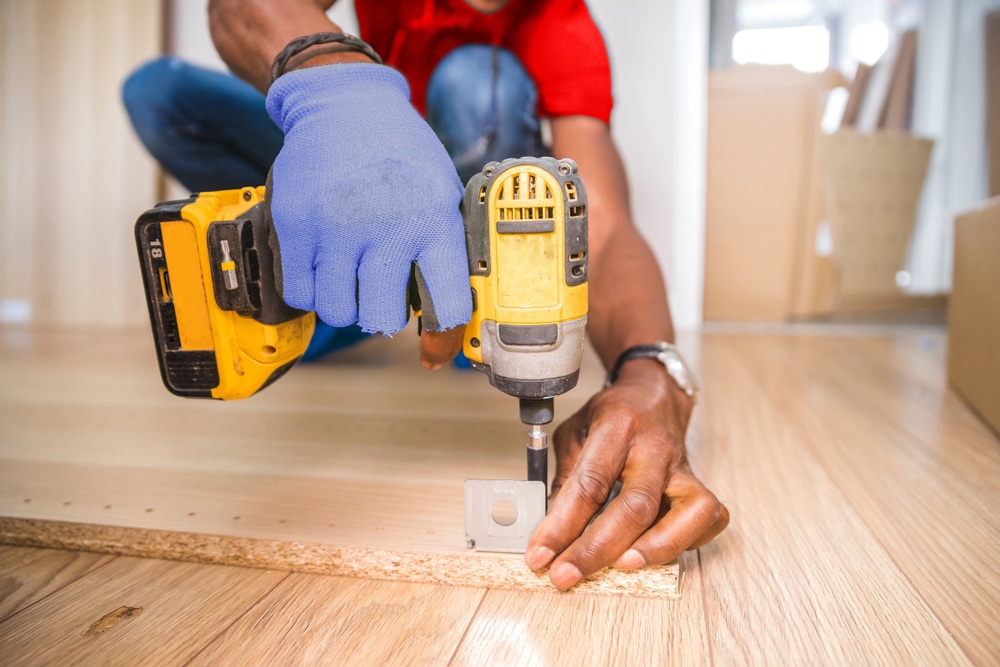
Published
Key Takeaways:
- If you have the time and money to take on major repair projects, focus on making sure your home’s roof, foundation, electrical systems, plumbing, and HVAC are in working order.
- Consider minor repairs — including painting the interior of your home, replacing flooring, and cleaning up your yard — if you’re on a tight timeline and budget.
- Consult with a local real estate expert before committing to any repairs. Without local expertise, it’s easy to waste money on improvements that won’t recoup their cost, and you might be able to get cash offers for your home in its current condition. Request offers from cash home buyers with an agent’s help today!
Major repairs l Minor repairs l Pros and cons l Ways to finance
Making repairs to your house before you sell can have a big impact on the final price, and how quickly you can attract a buyer.
However, you’ll need to determine which repairs will support a higher asking price and which aren’t worth your time and money.
If you’re looking to move fast, it might make sense to make only minor repairs so you can get your home listed faster.
Alternatively, you could skip repairs altogether and sell to a local cash buyer company or real estate investor.
When you sign up for our cash offer service, a local agent will present you with offers from cash buyers in your area, and give you an accurate home valuation so you know what your home is worth in it’s current state. It’s free, and there’s no obligation.
Repairs vs. upgrades
Here’s the difference: Repairs involve necessary maintenance to keep a house in good working condition, while homeowners make upgrades to improve their home’s appeal and add value.
What to fix up when selling a house?
The most important fixes to make before selling your house depend on your situation.
If your home is in poor condition and needs serious repairs, target a few key major projects — so long as they’re within your budget. Repairing your roof or even just tuning your HVAC system, could actually be a make-or-break factor for some buyers.
At some point, however, your home may be so distressed that you should cut your losses and sell your home “as is” with a real estate agent.
Of course, if your home just needs a few cosmetic updates, like basic landscaping or a fresh coat of interior paint, make those minor repairs. You can often make several small repairs to your home on the same day, and they’re typically not as costly as major repairs.
We’ve put together a list of important improvements — and their estimated costs — worth considering before listing your home.
Major repairs
Major repairs can be risky. They can cost tens of thousands of dollars with no guaranteed return on investment. However, if you have the cash on hand, they’re definitely worth considering — despite the potentially hefty price tag.
Why? A 2020 study conducted by the National Association of Realtors found 89% of home buyers finance their home purchase. Since most lenders will not back a mortgage for a home that needs a lot of repairs, you could lose out on potential buyers.
Let’s dive into some significant repairs you should consider making before listing your home on the market.
| Type of major repair | Estimated costs |
|---|---|
| Roof | $8,200 |
| Foundation | $4,500 |
| Electrical system | $1,350 |
| Plumbing (leaks, burst pipes) | $150-4,000 |
| HVAC replacement | $7,000 |
Roof repairs or replacement
Savvy sellers know buyers will likely pay less for their home if they don’t fix their roof.
If your home has a bad roof — meaning it either leaks or is nearing the end of its effective lifespan — lenders and appraisers will take note during inspections. You may need to renegotiate the price of your home with the buyer or agree to credit them funds to cover the cost of repairing or replacing the roof.
Putting a new roof on your home can be expensive — the average homeowner pays around $8,200. However, it can be worthwhile because buyers will be more attracted to your home knowing they won’t have to replace the roof for 20-30 years.
And if you just need to repair parts of your roof, even better! You’ll only have to shell out around $930 for supplies and a contractor to make the repairs.
Foundation repairs
Making foundation repairs to your home before selling is a good idea if you want to:
- Attract a wider pool of buyers
- Earn a higher price for your home
Foundation issues like cracks, water damage, and bowed walls are noticeable and can scare away potential home buyers. Most repairs cost around $4,500 but can be more depending on the type of foundation your house is laid on.
If you decide repairs aren’t worth it or cost too much, you’ll still be on the hook for disclosing known foundation issues to buyers. Buyers may even ask for repair credits to fix any damage if they choose to purchase your house.
Electrical system
Repairing your home’s electrical system can help ensure you don’t miss out on potential offers.
The National Association of Realtors found that nearly half of all homebuyers look to avoid homes with electrical problems. Hire a contractor to examine all switches, circuit breakers, and wiring to make sure all electrical systems are in working order.
If repairs are needed, expect to pay $1,350 on average.
Plumbing
Before listing, make sure your house’s plumbing functions properly. Many buyers won’t be interested if the system needs a lot of repairs.
When buyers see plumbing issues like leaky pipes or clogged drains, it sometimes signals more significant problems may be lurking elsewhere. This suspicion could result in additional inspections and an extended sale timeline — or less money in your pocket if the buyers ask for significant repair credits.
If you do choose to make plumbing repairs, prepare to shell out at least a few hundred dollars.
Some of the most common plumbing problems and their repair costs are:
- Leaking pipes: $150-350
- Pipe burst damage: $1,000-4,000
- Gas pipe: $250-750
- Clogged drains: $200
HVAC
Most buyers purchasing a home want the heating and cooling system working as intended, so they don’t need to worry about replacing it.
If you can’t afford to replace the entire HVAC unit, make sure it’s at least functioning correctly. Buyers generally want some kind of warranty on an HVAC system, so it’s important to ensure that it works before you close on the house.
If you decide to replace your HVAC, expect to pay between $5,000-10,000 for the new unit and installation, plus removal and disposal of the old system.
Pre-Inspection Report
If you’re not sure what repairs your home may need, consider getting a pre-inspection report from a local home inspector. The report, which typically costs between $350-500, provides detailed information about your home and what repairs are needed.
If you decide not to make repairs, you could supply a prospective buyer with the pre-inspection report to show you’re transparent about what improvements are needed.
Minor repairs
If you don’t have the time or money to make significant repairs, you can still make minor changes to your home to help it stand out.
And there’s good news about undertaking smaller home projects: You can do most of them yourself, allowing you to save on contractor fees.
| Type of minor repair | Estimated cost |
|---|---|
| Painting | $200-1,000 per room |
| Flooring | $3-22 per square foot (depends on material) |
| Landscaping | $50-700 (depending on the project) |
Painting
Painting the interior of your house is one of the easiest ways to give your home a facelift before you place it on the market.
You can do all of the work yourself — starting by picking the right color. Most experts recommend painting rooms in neutral or earthy tones that don’t distract from the home’s natural light.
Expect to pay between $2-6 per square foot, or $200-1,000 for a single room.
Flooring
Bad flooring can quickly turn away home buyers because it’ll be one of the first things they notice when entering your house.
Costs to replace flooring mainly depend on the material that you choose. However, you can expect to pay between $3-22 per square foot.
Here’s a closer look at what you’ll pay for materials and flooring installation:
| Types of flooring | Cost per square foot |
|---|---|
| Hardwood | $6-22 |
| Laminate | $3-10 |
| Carpet | $3.50-11 |
| Natural stone tile | $6-20 |
| Ceramic or porcelain tile | $7-20 |
Landscaping
Making improvements to your home’s landscaping is one of the best ways to help your home stand out to buyers.
With a bit of sweat equity and a few hundred dollars, you can enhance your home’s overall curb appeal. The average landscaping project only costs around $700.
So, what should you consider doing? You can:
- Plant flowers: $300-3,000
- Mow your lawn: $50-220
- Trim your trees: $75-1,000
- Remove a tree: $400-2,000
- Install a sprinkler system: $1,700-3,500
Pros and cons of making repairs
| ✅ Pros | ❌Cons |
|---|---|
| Repairs may increase the amount a buyer will pay for your home | No guarantee of a return on your investment |
| Your home may attract more buyers | Major repairs can take weeks or months to complete |
| You may be able to avoid repair credits or concessions | You’ll likely have to cover the repairs out of pocket |
| Lenders are more likely to approve a mortgage for a home in good condition |
Ways to finance important repairs
You don’t necessarily need cash in hand to afford making repairs. There are several financing options available that you could use to help spruce up your home.
Home improvement loan
Home improvement loans are unsecured personal loans banks and credit unions offer to help homeowners finance repairs and improvement projects.
Since they are unsecured, you don’t need any home equity or to use your house as collateral to qualify. Lenders base interest rates and qualifications on your credit history.
Funding for home improvement loans arrives quickly, meaning you won’t be stuck waiting to make repairs for days or weeks.
Home equity line of credit
Home equity lines of credit (HELOCs) are secured loans backed by your home.
You can qualify for lower interest rates than unsecured personal loans because you need to have sufficient home equity to borrow.
But there’s one major downside to HELOCs: If you fail to make payments on time, the bank could foreclose on your home.
Home equity loan
People often refer to home equity loans as “second mortgages.” Banks typically pay them out in one lump sum, then the borrower repays the loan over several years in fixed monthly payments.
Related articles
Want to learn more about selling a home that is in less than perfect condition? Read these articles to learn more about all of your options.
Selling a Home As Is: Pros, Cons, and Options for Selling If your property is in need of repairs, but you don’t have the time or money to make fixes, you can always sell as is. Learn the best way to sell your home as is and whether it’s the right decision for you.
Selling an Inherited Home: What You Need To Know When you inherit a house, selling it might seem like the best option. But make sure you understand all the legal and financial pros and cons before putting the property on the market.


Leave a Reply